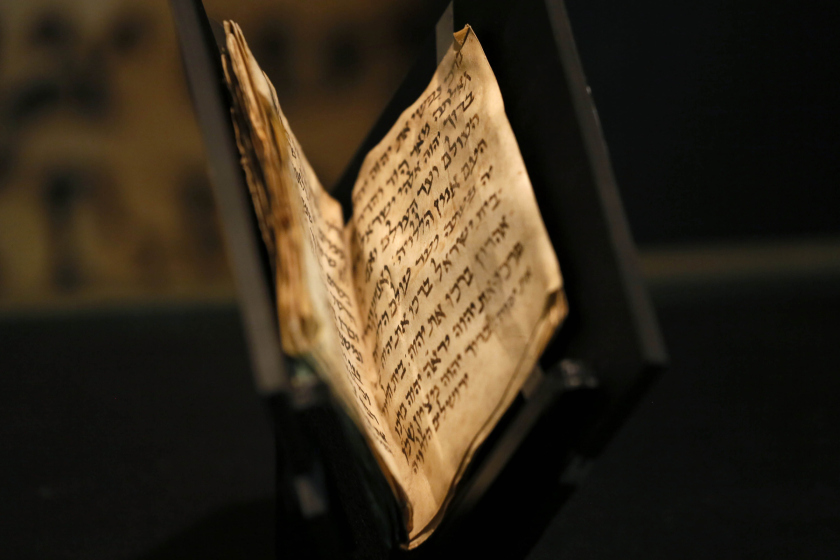 There are few places in the world like Turkey, where Jewish communities dating back to antiquity continue to thrive. Jewish history has been influenced greatly by Turkish diplomacy. To this day, Jews continue to live in peace, despite the constant turbulence in the Middle East.
There are few places in the world like Turkey, where Jewish communities dating back to antiquity continue to thrive. Jewish history has been influenced greatly by Turkish diplomacy. To this day, Jews continue to live in peace, despite the constant turbulence in the Middle East.
Jewish settlement in the region is thought to pre-date the 4th century. Records of Jewish life and trade were discovered in the archeological excavations of the ancient cities of Ephesus, Sardis, Pergamon, and Smyrna (now Izmir). Greek depictions of Jewish settlements, synagogue ruins dating back to the 2nd century, and an inscription proclaiming the rights accorded to the Jews by Emperor Augustus all indicate that the existing Turkish Jewish community is the product of countless millennia of history.
The Ottoman conquest of Turkey was seen as a miracle for most Jews, who felt the strain of persecution and prejudice from their former Byzantine rulers. When the Ottomans at last conquered Basra and named it their capital in 1324, Sultan Orhan gave the Jews permission to build the Etz ha-Hayyim (Tree of Life) Synagogue, which remained in service until 50 years ago. From the 15th century onwards, western European immigration was widely encouraged by the rulers of the Empire, who desired more Jewish communities to flourish under their reign.
Turkey is perhaps most famous for its earnest welcome of the Sephardic Jews fleeing the Spanish Inquisition in 1492. The Ottoman ruler of the time, Sultan Bayazid II, famously stated, “The Catholic monarch Ferdinand was wrongly considered as wise, since he impoverished Spain by the expulsion of the Jews, and enriched Turkey.”
More than 150,000 Jews fled Spain and were therefore instrumental in re-populating the capital city, which had been decimated by the Black Death and Christian crusades. The face of Turkish Jewry was completely altered as the Romaniote Jews—descendants of Greek-speaking Jews—mingled with the influx of Spanish Jewry.
For almost three centuries after this historic emigration, the Jews of Spain experienced a golden age in Turkey. During this era, Jews served as court doctors, Ottoman diplomats, authors and innovators. Joseph Nasi, the Duke of Naxos, was a Portuguese Marrano (secret Jew) as was Aluaro Mandes, who was named Duke of Mytylene as a reward for diplomatic services rendered to the Sultan. Salamon ben Nathan Eskenazi set the grounds for relations between the Ottoman and British Empires. The famed Joseph Caro published the Shulkhan Aruch, (Code of Jewish Law) and Shlomo Halevi Alkabis conducted a song that we still sing to this day around the Shabbat table, “Lekhah Dodi” (Come My Beloved).
At this time, Judeo-Spanish literature, written primarily in Ladino, began to flourish. The printing press was introduced to Turkey when in 1493, only one year after expulsion, David and Samuel ibn Nahmias established the first Hebrew printing press in Istanbul. The Jews brought new life to a place that welcomed them wholeheartedly.
When prejudices from the European world began to make their way through Ottoman society, the leaders of the empire stood firm in their esteem for the Jewish people.
The years leading up to World War I were the beginning of the end of Ottoman prosperity. Many Jewish communities were taken over by Christian leaders, and Turkish boarders were reduced.
After the war, the Ottoman Empire was replaced by the Turkish Republic. Mustafa Kemal Ataturk was elected president, the Caliphate was abolished, and a secular constitution was adopted.
During World War II, Turkey continued to be a safe haven for a world that seemingly turned a blind eye to the fate of the Jewish people. It served as a shelter and passage for many Jews fleeing mid century European prosecution while communities in nearby Greece were all but destroyed by the Nazis. Many Turkish diplomats strove to save their fellow countrymen. According to Professor Stanford J. Shaw, approximately 15,000 Turkish Jews from France, and 100,000 Jews from Eastern Europe were saved because of Turkish efforts.
In a time of such unrest however, no country can be said to have been blameless. The pogrom of Istanbul—a mere 10 years after the Second World War—resulted in astronomical property damages to Armenian, Jewish, and Greek communities. The event shocked minorities throughout the country, resulting in a voluntary exodus of 10,000. Traditionally speaking, anti-Semitism in Turkey was rare, though a rapid increase in prejudice against Jews was shown to be a direct result of the formation of Israel.
The Neve Shalom Synagogue in Istanbul has been repeatedly attacked by Islamic militants—first in 1986 and most recently in 2003. Jewish worshippers have been gunned down and wounded in large numbers, though the government has taken no responsibility for this. However, police claim that the attacks were too sophisticated to have been carried out by the Great Eastern Islamic Raider’s Front, the group that has claimed accountability for this.
For the most part, official diplomatic relations between Turkey and Israel have been smooth since Israel’s formation. Turkey was among the first to ratify Israel’s statehood and has since then operated closely in military and economic related affairs. Turkey has also supplied gas, oil, and other essentials to Israel through a series of pipelines, and is vital to the state’s survival. Turkish-Jewish cultural centers aiming to preserve Turkish-Jewish heritage have been established to promote intercultural relations and to refresh the public’s memory of the once harmonious relations between Turks and Jews. If nothing else, their efforts are reassuring to the Jews of present day Turkey.
Today there are approximately 26,000 Jews living in Turkey, the majority of whom reside in Istanbul. Sephardic Jews make up about 96% of the population. Turkish Jews are legally represented by the Chief Rabbi, or Hahambasi, as was the tradition for centuries. Rabbi David Asseo was the chief rabbi from 1961 to 2002. Today the Chief Rabbi is Rabbi Ishak Halevi. The chief rabbi is elected by a religious council made up of a Rosh Bet Din and three rabbis. Thirty-five lay counselors look after the secular affairs of the community and an executive committee of 14—the president of which must be elected from among the lay counselors—run the daily affairs.
There are currently 32 active synagogues in Turkey, 16 of which can be found in the capital. Many date back to long ago, especially Ahrida Synagogue in the Balat area, rumored to be from the middle of the 15th century. The 15th and 16th century Haskoy and Kuzguncuk cemeteries in Istanbul are still in use today.
The Neve Shalom Synagogue, located in Karaköy is the largest Sephardic synagogue in Istanbul. It was inaugurated on Sunday March 25, 1951 and is open. Unfortunately, it has been the target of three terrorist attacks.
Since the Gaza flotilla incident of May 2010, Turkish-Israeli relations have been strained. A Turkish flag was flown aboard one of the ships sending illegal aid to Gaza Strip Palestinian activists, and more than a dozen Turkish citizens attacked Israeli soldiers upon seizure. Life has become somewhat hazardous for Turkish Jews amongst pro-Gaza supporters.
Younger community members converse primarily in Turkish, while older members are more familiar with French and Ladino. A widespread effort has been made to keep Ladino alive. The community has for generations circulated their own publications, the most relevant being Salom, an eight page weekly newspaper written primarily in Turkish. Jewish hospitals, elderly homes, and orphanages have been set up in Izmir and Istanbul, providing welfare institutions to their largest communities.
The Jews of Turkey are a minority next to the overwhelming Muslim population, yet they continue to distinguish themselves as prominent contributors in every field.



